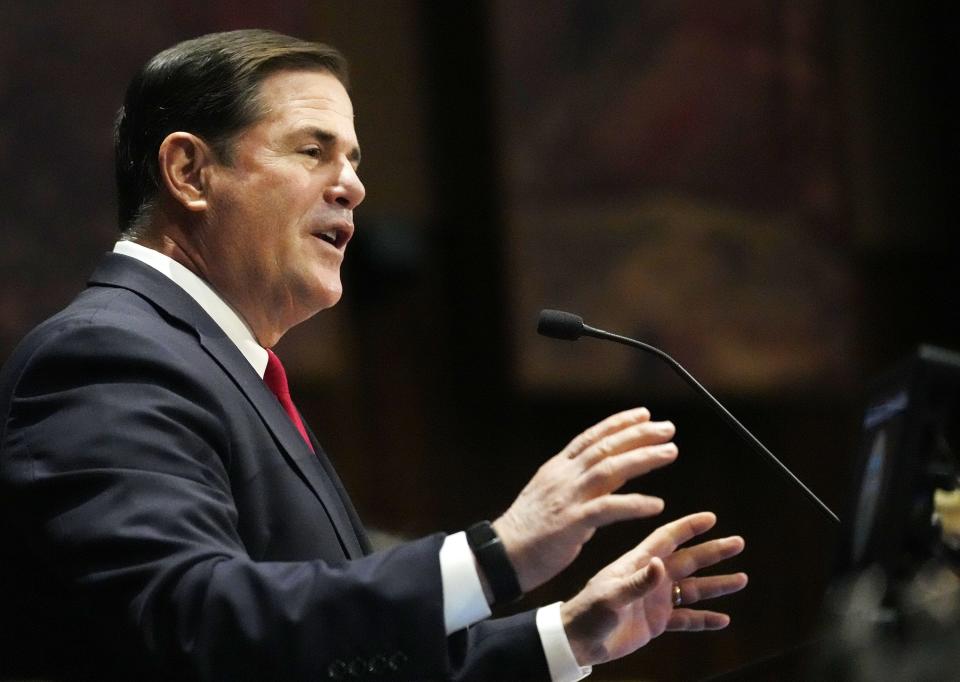Arizona hides doctor discipline, Republic investigation finds
Arizona obscures the written reprimands of more than 600 active doctors.
Instead of posting these accounts – including violence, sexual misconduct, injury to patients and improper prescribing of dangerous drugs – on a website that could be accessed by the general public, the state hides these documents, The Arizona Republic found.
“It’s wrong,” said Lisa McGiffert, of Patient Safety Action Network, a nonprofit working to end medical harm. “It’s absolutely wrong that a public document in this day and age is not easily accessible to the public on the medical board website. People have a right to know about the status of their doctor’s license and they have a right to know what the doctor’s past issues have been.”
What does it mean when your doctor has an 'advisory letter'?
The Arizona Medical Board is supposed to protect the public by regulating the state’s tens of thousands of physicians. The board slapped hundreds of actively licensed doctors with “advisory letters” – it’s the most common action they take against a doctor.
The letters illuminate wrongdoing, including: removing a patient’s ovaries without consent, inadequate removal of a brain tumor, operating on the wrong knee, failing to treat a patient exposed to gonorrhea, recommending an angiogram for a patient who didn’t need one, trying to prescribe drugs for euthanasia, failing to take time to check instruments before a circumcision, failing to follow standards for sterilization, failing to promptly report a DUI, being impaired while on-call, and showing up to work under the influence of alcohol.
But that’s all hidden.
The documents revealing that misconduct are public record by law and the state medical board maintains online profiles on doctors. But the board says state law and an executive order prevent it from posting the letters online – and a doctor’s online profile doesn’t show if they exist. On the contrary, a reprimanded doctor’s profile might even misleadingly show “none” in the “board actions” section.
“It’s counter to the purpose of the Arizona medical board – to protect the public,” said Carol Cronin, executive director of the Informed Patient Institute, which advocates for more transparency around health care quality and patient safety.
“They’ve gone through a process that results in an action that leads to a set of words on a piece of paper that should be easily available to the public,” Cronin said.
The advisory letters are considered “nondisciplinary” and they are issued when the board feels a violation is minor, a doctor has demonstrated rehabilitation or the board has inadequate evidence to pursue discipline. But they detail behavior the medical board found concerning enough to warrant a written scolding. That includes some issues revealed in a recent Republic investigation of Scott Brannan, a Phoenix area doctor, and the company where he rose to prominence, Modern Vascular.

“The advisory letters are nondisciplinary, between the medical professional and the board, and the board doesn't report them to the public,” company founder and board Chairman Yury Gampel said in a text message.
“Obviously they don’t feel that a simple nondisciplinary advisory should warrant public attention,” he wrote.
The newspaper’s investigation exposed Modern Vascular’s profit-driven approach to medicine and harm to patients, according to interviews, patient medical records and lawsuits contested in court by the company.
“We do a lot of amazing work,” Gampel said when fraud lawsuits against his company became public. “We save limbs every single day in all of our clinics.”
The company’s full response to The Republic's investigation is posted here.
Faces allegations: DOJ accuses Arizona-based Modern Vascular of $50M fraud scheme
The Republic’s investigation called for reforms guided by experts, including posting advisory letters online to help patients learn about their doctors.
“By keeping certain orders and actions off the state’s website and failing to give any information about even the existence of this kind of licensing action, the patient is really given that false sense of security,” said Patricia Kelmar, who advocates for health care reforms on behalf of the Public Interest Research Group.
“They’re going to think that their physician’s record is squeaky clean when, in reality, the doctor did something that the licensing board found troubling enough to issue a formal notice,” Kelmar said. “And patients deserve to know that and have the right to use that information to make their own best decision as to whether or not to use that physician in the future.”
Indeed, Brannan’s advisory letters are absent from his online profile.
Another doctor who worked at Modern Vascular also was chastised by the board. Cordell Esplin was written up for “failure to respond appropriately to post-procedure studies that suggested the failure of the revascularization attempt and his failure to address his patient’s extreme pain level and persistent pulselessness post-procedure in addition to insufficient medical record-keeping.”
In a response to board members, Esplin wrote he disagreed with their conclusions and said the complaint came from an “economic competitor.”
“The complaining vascular surgeons filed this case as part of a series of complaints filed wholesale against competing interventional radiologists,” Esplin wrote.
Esplin told The Republic he was scrutinized by the medical board at a time they were looking into Modern Vascular, where he worked for two years.
“I was sort of in the penumbra of their glow,” he said.
Esplin wrote in a text message he was written up because of how the company operates.
“Their business model leaves them open for criticism,” he wrote. He declined to elaborate.
At least 40 active Arizona doctors were the subject of more than one hidden advisory letter, including orthopedic spine surgeon Dr. Terrence Crowder.
He was written up five times since 2015, records from the medical board show: inadequate supervision of a physician’s assistant; inadequate communication; improper placement of a battery in a spinal cord stimulator; failure to document reasoning for not ordering an MRI and failure to promptly assess a patient; and failure to maintain an updated agreement with a physician assistant.
A prospective patient looking at Crowder’s profile on the medical board website wouldn’t see any of that – the profile shows no board actions.
Crowder didn’t respond to messages left with his staff and an attorney who previously represented him.
“I think that advisory letters should be posted publicly on the medical board website,” said Helen Haskell, president of patient safety organization Mothers Against Medical Error.
Meanwhile, The Republic is making it easier for patients to know whether their doctors have been reprimanded. Below is recent and incomplete data from the board that shows doctors of medicine and osteopathy, as well as physician’s assistants, who were slapped with advisory letters like Brannan. The Republic also obtained advisory letters issued to medical doctors. Doctors wishing to submit their comment on their advisory letter to The Republic can email reporter Andrew Ford at aford@arizonarepublic.com with subject line Re: Advisory Letter.
Anybody can get the latest copies of any doctor’s advisory letter by filling out a public information request form and emailing it to publicinformation-noreply@azmd.gov. Those without computer access can call the medical board’s public records coordinator at 480-551-2717.
The letters contain important information about doctors. Brannan’s letters show the board chastised him for puncturing an artery during a procedure and “failure to offer appropriate, established treatment alternatives to patients as their conditions worsened despite the performance of multiple endovascular procedures.”
Brannan wrote to the board that it issued one letter “in bias.” He didn’t respond to a reporter’s calls, emails, texts and a message left with an attorney who represented him. But he previously spoke to the reporter for more than 16 hours for the newspaper investigation of Modern Vascular.
The Republic would like to hear from anyone who can share more about Modern Vascular.
How did this become law?
The law keeping advisory letters off the internet passed more than 10 years ago, with some controversy.
“I still really do have some concern about the reduction in the transparency,” said former state Sen. Rick Murphy, R-Peoria, as he voted against moving the bill forward in the lawmaking process, a state recording shows.
A representative of the Arizona Medical Association – which represents the interests of doctors – supported the bill, the state recording shows. The representative didn’t speak publicly about it at the time.
“(The association) was in support of this bill because the amount of available information in these documents is often so scant that it is misleading,” association spokesperson Shelby Job wrote in an email to The Republic. She wrote that the association doesn't have a formal policy on whether the advisory letters should be posted online.
The bill’s sponsor, state Sen. Nancy Barto, R-Phoenix, didn’t answer questions about why she sponsored it or whether it would be undone. Instead, she took a shot at the state medical board.

“I cannot speak to whether members would consider changes to this statute next session, but I would say that the Modern Vascular issue wouldn’t be resolved simply with an advisory letter placed on the website. It seems that this physician was a bad actor with a history of issues that should have been vetted more thoroughly through the licensure process and by the Board. The Board is supposed to weed out bad actors and regulate them accordingly. In this case, it appears it fell short.”
Barto recently lost her bid for reelection. Her Democratic successor, Christine Marsh, said she would be willing to explore the issue.
Restrictions on public access to such government records were expanded in an executive order by Republican Gov. Doug Ducey, which says: “A State agency subject to this Order shall not publicize any directives, policy statements, documents or forms on its website unless such are explicitly authorized by the Arizona Revised Statutes or Arizona Administrative Code. Any material that is not specifically authorized must be removed immediately.”
The restriction is part of Ducey's annual orders seeking to curb the creation of new state regulations, though a Republic review found he will leave office with more rules on the books.

Barto’s law and Ducey’s executive order were cited by the Arizona Medical Board as reasons it couldn't post the advisory letters online.
“The medical board did not consult with us,” said Ducey’s spokesman, C.J. Karamargin. “We read this section of the executive order differently, and what they’re doing is not our intent. The information should be made available.”
Karamargin said the letters should be posted online. He declined to comment on the state law the medical board says prevents the posting of the letters.
The board’s executive director, Patricia McSorley, didn’t comment on the criticism from Barto or Ducey’s spokesman. She stressed that a doctor under board scrutiny is afforded the chance to make a defense, and the letters allow the board to track conduct over time. She pointed to fine print on the bottom of a doctor’s online profile that says patients can ask for additional public records.
“The Board takes its charge of public protection seriously and is judicious in its deliberations,” McSorley wrote in an email.

Democratic Gov.-elect Katie Hobbs ran on a platform that includes government transparency, but she and her staff didn’t answer questions about the advisory letters – or even the proper title of a staff member to whom an emailed statement was attributed.
She and her staff wouldn’t say whether she would undo the executive order or support rolling back the law that restricts the medical board. A representative for Hobbs wrote in an email that Hobbs would generally review standing executive orders and cut the ones that don’t serve Arizonans.
"Governor-elect Hobbs is laser-focused on the transition and hitting the ground running on Day One of her administration,” Joe Wolf, another spokesperson for Hobbs, said in an email. “While it is still early to comment on specific legislation, we are committed to building a government that works for all Arizonans, with real transparency, and will take actions that reflect that goal."
Hobbs has previously commented on specific legislative goals.
The opacity of doctor misconduct spreads far beyond Arizona, though the Patient Safety Action Network last year scored the Arizona medical board’s website below average.
There is a national listing of troubled doctors called the National Practitioner Data Bank. But the identities of the database’s problematic doctors are kept hidden from the public. The Republic called for that data to be released, a reform also encouraged by Bob Oshel, a former associate director for the databank.
Oshel was shocked Arizona insisted that a public record stay off a state website.
“I think that's just totally ridiculous,” he said. “The purpose of having a state medical board is first and foremost: to protect the public. And making it difficult for the public to find out that a doctor has something that would be very troubling in his record just doesn't make sense – protecting the doctors rather than protecting the public. I think that if it takes the Arizona Legislature to change that they certainly ought to do it.”
Share investigative story ideas with Andrew Ford at aford@arizonarepublic.com or on Twitter @AndrewFordNews.
This article originally appeared on Arizona Republic: Arizona Medical Board has reprimanded doctors, but records are hidden

